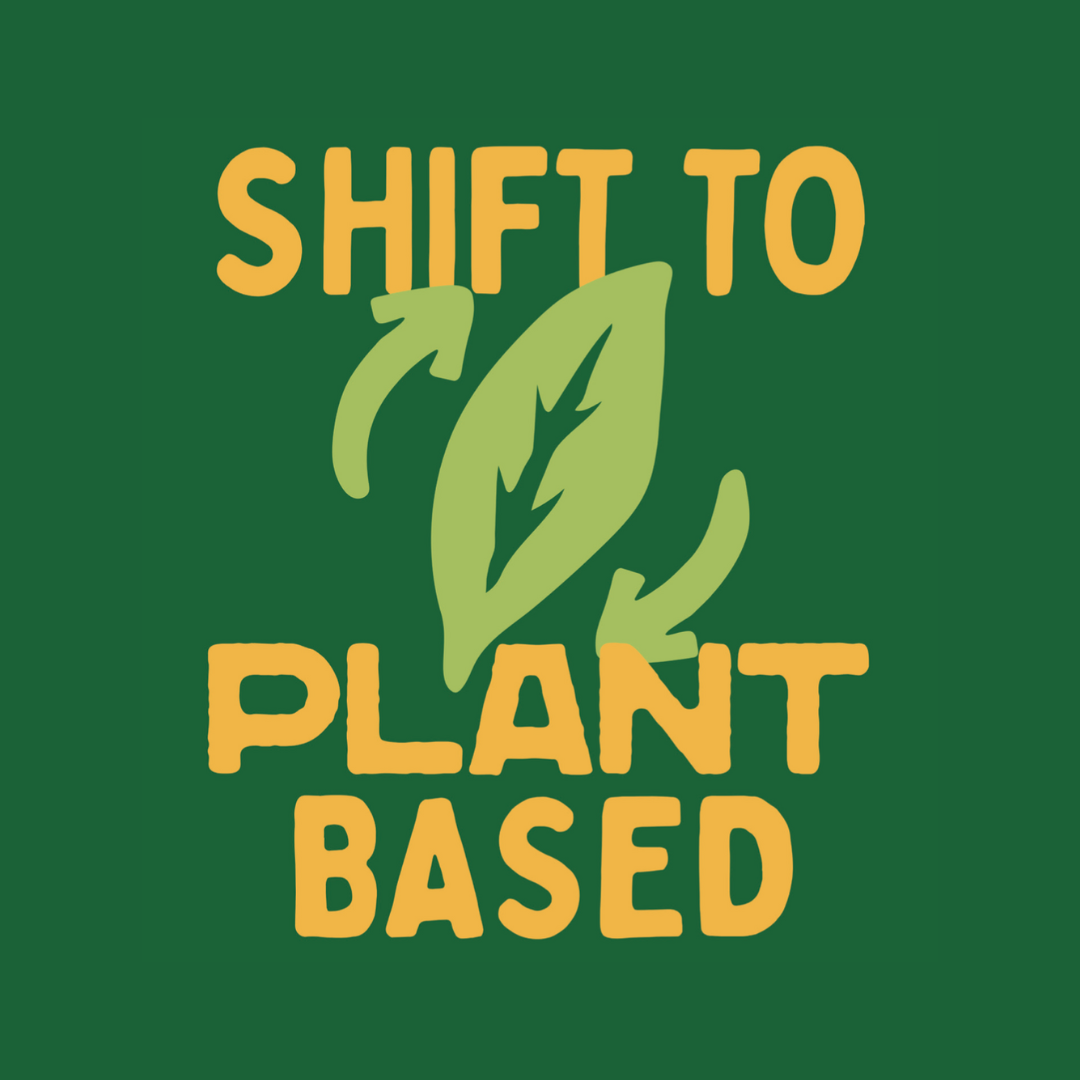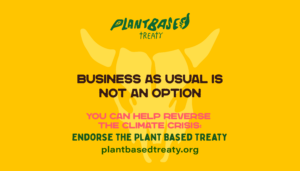
The science is in. Shifting to a plant-based food system is essential to avoid climate and ecological breakdown. And now we have a roadmap to help make it happen.
Most of us are all too familiar with the inconvenient truth about climate change. Even though it remains under-reported in mainstream media, its impacts are making themselves known all over the world. Here in Australia, we’ve been experiencing them first hand in recent years, from bushfires and floods to coral bleaching events and an escalating extinction crisis.
The latest report from the Intergovernmental Panel on Climate Change (IPCC) has called for urgent global action to avoid irreversible impacts. Greenhouse gas emissions must start declining by 2025, at the latest, and drop by at least 43 percent this decade to ensure a liveable future. The reality is, our beautiful planet simply cannot sustain business as usual, let alone further destruction, and solutions are needed now.
But amid all this, there is a convenient truth. Addressing agriculture and land use is a solution that is within reach and largely neglected so far. By scaling back animal agribusiness and shifting to plant-based food systems, the world can achieve rapid emissions reductions, replenish natural carbon sinks, and simultaneously restore the ecosystems that support the entire web of life.
This is where the Plant Based Treaty campaign comes in. Launched in 2021, it’s a global movement that highlights the fundamental need for a food system transition and provides a roadmap to get there. Here’s how.
EAT PLANTS, PLANT TREES
At the heart of the Plant Based Treaty are three pillars for policy change.
- Relinquish Stop exacerbating the problem. Freeze further expansion of animal agriculture, including no new animal farms, slaughter facilities, or further conversion of wild areas for animal agriculture.
- Redirect Eliminate the driving forces behind the problem while promoting plant-based foods and supporting an active transition away from animal-based food systems.
- Restore Heal the problem while building resilience and mitigating climate change by restoring terrestrial and marine ecosystems, including major reforestation projects.
The Plant Based Treaty campaign is creating a groundswell of support and action in favour of these proposals among individuals, organisations, businesses, politicians, and subnational governments all around the world. Together, this mass movement is building pressure on national governments to negotiate a global treaty which will serve as a companion to the 2015 Paris Climate Agreement that commits to keeping global temperatures within 1.5–2°C above pre-industrial levels.
“The Paris Climate Agreement is silent on animal agriculture, despite it being a critical contributor to global warming,” explains Plant Based Treaty global campaign coordinator Anita Krajnc. “By implementing policies in line with our three Rs – Relinquish, Redirect, and Restore – nations can meet and surpass their emission reduction targets, as well as absorbing the excess carbon from the atmosphere through rewilding and reforestation, bringing us down to safe levels.”
The treaty is a campaign model with an inspiring track record. Similar movements successfully led to the adoption of the Nuclear Non-Proliferation Treaty and the Montreal Protocol that instituted a global ban on ozone-depleting substances. Indeed, the idea for a Plant Based Treaty was generated in close consultation with the popular Fossil Fuel Treaty initiative, which is a parallel campaign for a just transition away from fossil fuels.
THE POWER OF THE PLATE
The Plant Based Treaty also highlights the interconnectedness of climate change with multiple other global challenges, from biodiversity loss to public health. Let’s take a closer look.
Less meat, less heat
A wealth of scientific literature points to the climate benefits of shifting to a plant-based food system. The reason? Animal agriculture is a major source of greenhouse gases, estimated to contribute between 16.5 and 28 percent of global emissions. Research shows that all plant foods are more climate friendly than even the lowest-impact animal products, regardless of how they are produced or transported, and scientists warn that business-as-usual growth in meat and dairy consumption would bring warming above the 2°C threshold, even if we make major reductions in other sectors.
Shifting to a plant-based food system offers two major circuit breakers on planetary heating. First, it would address the methane emergency. The UN has called for 45 percent cuts to methane by 2030, and animal agriculture contributes 32 percent of this potent greenhouse gas globally. Dr Peter Carter, an IPCC expert reviewer and prominent supporter of the Plant Based Treaty, makes the position clear. “Ethically, all unnecessary methane sources have to be cut as fast and far as feasible. That means global veganisation is now a survival imperative.”
Second, moving from animal to plant-based agriculture would free up vast areas of land that are currently used for grazing and growing animal feed, with research indicating that a global transition to vegan diets would reduce our agricultural land use by 75 percent. This offers a powerful climate mitigation opportunity, as it would enable the restoration of natural carbon sinks such as forests, peatlands, and soils – the safest and most cost-effective means of absorbing emissions from the atmosphere.
Global veganisation is now a survival imperative.
Healthy planet, healthy people
Alongside greenhouse gas reductions and sequestration, the shift to a plant-based food system offers multiple co-benefits for people and planet – and of course for the animals currently bred, confined, and killed in the food system.
As well as being climate friendly, growing plants for human consumption requires far less land and fresh water, not only enabling restoration of ecosystems and biodiversity but also reducing polluting runoff from fertiliser and factory farm waste. The benefits extend to marine ecosystems too, by reducing the greenhouse gases that cause ocean warming and acidification, the nitrogen pollution responsible for ocean dead zones, and the direct destruction of marine species by ocean trawling and the toxic impacts of fish farms.
At the same time, a plant-based food system offers the opportunity to improve public health globally by reducing the burden of diet-related disease and redirecting crop land to feed humans directly, rather than diverting around a third of the global harvest through animals bred as livestock. It is also our best protection against emerging zoonotic infections that jump from wild or farmed animals to humans and addresses the antibiotic-resistance crisis that is being fuelled by overuse in farmed animals on land and in fish farms.
When it comes to jobs and economic opportunities, the food transition also offers hope. The current climate trajectory threatens farming livelihoods all around the world, but animal-free alternatives abound. Governments can shift subsidies to support the adoption of sustainable plant-based production and get behind the alt-protein sector, which is already taking huge strides in creating meat, dairy, and egg replacements from plants, cell cultures, and fermentation.

DO LOOK UP!
In an era of crisis, we might succumb to denial or defeatism, but there’s never been a more important time to channel our concern into action. Many of us are doing what we can through our individual daily choices, and this is an empowering way to make a difference every day. Despite this, it’s easy to feel disheartened when we see governments continuing to subsidise polluting industries, as well as those industries using greenwashing tactics and the promise of techno-fixes (methane masks for cows, for example) to avoid making meaningful changes.
There’s a plethora of plant-based solutions that can be implemented, starting now.
“This is why we need a roadmap for a systemic transformation in line with the science,” says Anita. The Plant Based Treaty provides this roadmap. Under each of its three demands, there’s a plethora of plant-based solutions that can be implemented, starting now. Whether it’s veganising canteen menus, starting local food gardens, education and outreach initiatives, or supporting innovation, it promotes action in real time at every level and in every setting, while simultaneously building pressure for a binding global treaty.
As of today, over 85,000 individuals had endorsed the treaty, including Nobel laureates, IPCC scientists, politicians, and celebrities, as well as 21 cities, 1,137 nonprofit organisations, and over 1,200 businesses – and the momentum keeps growing, including recent endorsement by the city of Edinburgh, the first European capital to join the campaign.
As an individual citizen, each of us can endorse the treaty at plantbasedtreaty.org and discover other ways to take action. No matter who we are or where we live, this is a movement for a brighter future that we can all be part of.





















